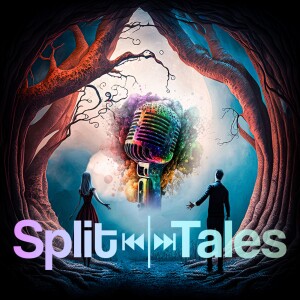
Monday Mar 25, 2024
S1 E4: Chantell's Tale
This episode focuses on the tale of Chantelle
As she finds herself entangled in a web of infidelity and manipulation. Despite her fierce self-sufficiency, Chantelle's journey reveals that anyone can become a victim of an abusive relationship.
Follow us online: www.splittales.com.au
Facebook: Split Tales
Instagram: Split Tales
Tiktok: Split Tales
Resources for this episode are as follows:
- For domestic, family and sexual violence counselling, information and support service support reach out to 1800RESPECT via phone on 1800 737 732 and online at www.1800respect.org.au
- If you are someone you know is experiencing suicidal thoughts or in need of psychological support reach out to LifeLine on 13 11 44 or visit www.lifeline.org.au
Source material used in this episode includes:
- Dopamine Nation, Dr Anne Lembke, 2021, Headline Publishing Group
- Banks, J. and Waters, J. (2023) An examination of the interrelationship between disordered gambling and intimate partner violence. International Review of Victimology
- This study stated “note that poor impulse control may underpin both the development of gambling disorders and Intimate Partner Violence”
- Manoochehr Taghi Pour, et al. (2019). Infidelity in Marital Relationships. Psychology & Psychological Research International Journal
- This study stated, “Low conscientiousness and low agreeableness share the common component of impulsivity and inability to delay gratification and are robust predictors of infidelities.”
- Quote” Researchers have found that marital Infidelity has negative effects on couples’ and parents’ relationships and may be the most feared and destroying experience of couple relationships, which may cause divorce which effects on couple, parents and their children. The process of healing deep emotional wounds of mistrust, betrayal, sadness, loss of confidence is arduous but worth the effort”
- This study refers to five categories of motives for infidelity [which are sexuality, emotional satisfaction, social context, attitudes-norms, and revenge-hostility. Sexuality motives consist of the desire for diversity and dissatisfaction with the primary sexual relationship. Emotional satisfaction might imply relationship dissatisfaction, ego bolstering, and/or emotional attachment to the other person. Social contextual factors refer to opportunity and absence of the primary partner. Attitudes-norms include sexually permissive attitudes and norms. Revenge-hostility applies to infidelity that occurs in retaliation for some perceived wrong by the partner or spouse
- Fong TW. (2005) The biopsychosocial consequences of pathological gambling. Psychiatry (Edgmont).
- Gambling has been defined in a variety of ways but can be best described as “putting something of value at risk on an outcome that is due to chance.
- “Pathological gambling, also known as compulsive gambling or disordered gambling, is a recognized mental disorder characterized by a pattern of continued gambling despite negative physical, psychological, and social consequences.7 It is listed in the DSM-IV as an impulse control disorder”
- Knopp K, Scott S, Ritchie L, Rhoades GK, Markman HJ, Stanley SM. Once a Cheater, Always a Cheater? Serial Infidelity Across Subsequent Relationships. (2017) Arch Sex Behaviour
- Our results indicated a threefold increase in the likelihood that a person will engage in infidelity if they already have a history of engaging in ESI...
- Cummings, E. M., & Davies, P. T. (2010). Marital conflict and children: An emotional security perspective. Guilford Press.
- Di Chiara G. (1997) Alcohol and dopamine. Alcohol Health and Research World.
- Alcohol affects dopamine release in the NAc, not only through its associated gustatory stimuli but also through its direct actions on the brain
- https://www.amenclinics.com/ states
- “Problems in the brain’s self-control network can also lead a person to cheat on their significant other”
- https://www.aihw.gov.au/ states
- "Globally, gambling has expanded at a rapid pace in recent decades with new technologies and emerging products, and related harms are an increasing concern. The betting sector in Australia is among the most profitable worldwide. The average annual income through betting is roughly $5 billion every year. Most casinos are intended to entice visitors, generating an estimated $4,900 for the Australian betting sector"
- https://accumulate.com.au/australia-gambling-statistics states
- "Although the legal gambling age is set at 18, betting has become increasingly frequent among adolescents in recent years. Shockingly, one out of five individuals who have an issue with compulsive gambling began placing bets before they reached their eighteenth birthday"
Split Tales is intended for a mature audience. Episodes discuss topics that can be disturbing including graphic depictions of domestic violence, including emotional, physical and sexual violence, discussions of mental health, addictions and suicide. There is also course language. In some episodes, names and identifying details have been changed to protect the privacy of individuals. The host is not a therapist, doctor or lawyer and opinions expressed from guests on the show are their own and don't necessarily represent Leah’s views or the views of Split Tales.
No comments yet. Be the first to say something!